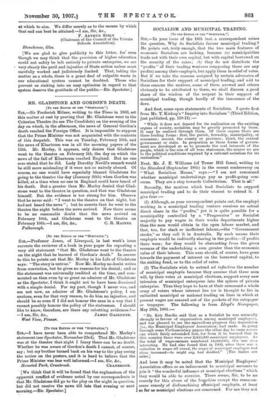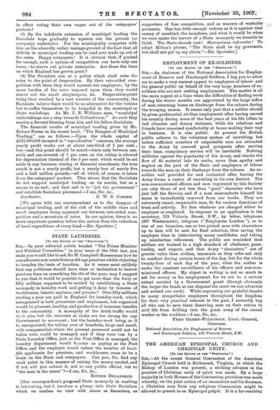SOCIALISM AND MUNICIPAL TRADING.
Pro THE EDITOR OF THE "SPECTATOR."]
Sia,—In your issue of the 16th inst. a correspondent raises the question, Why do Socialists favour municipal trading ? He points out, truly enough, that the two main features of economic Socialism are lacking, because (a) municipalities trade not with their own capital, but with capital borrowed on the security of the rates ; (b) they do not distribute the "profits " of their trading ventures (supposing there are any profits) among their employes, but apply them in relief of rates.
But if we take the reasons assigned by certain advocates of Socialism for their support of municipal trading, and add to these reasons the motives, some of them avowed and others obviously to be attributed to them, we shall discern a good share of the wisdom of the serpent in their support of municipal trading, though hardly of the innocence of the dove.
And first, some open statements of Socialists. I quote first from Mr. T. Kirkup's " Inquiry into Socialism " (Third Edition, just published, pp. 110-11) :—
" While it does not depend for its realisation on the existing organs of society, socialism may be greatly promoted by them. It may be realised through them. Of these organs there are three leading forms : first, the parish, township, municipality, or commune; second, the county or province ; third, the central government or state. In proportion as these forms of govern- ment are developed so as to promote the real interests of the people, which is the aim of all true statesmen, tho nearer we are to the political conditions required by a rational socialism for its realisation."
Next, Mr. J. E. Williams (of Tower Hill fame), writing to the Standard (September 19th) in the recent controversy on " What Socialism Means," says :—" I am not concerned whether municipal undertakings pay as profit-going con- cerns. They are a step towards Collectivism. That is all."
Secondly, the motives which lead Socialists to support municipal trading and to do their utmost to extend it. I give four :- (1) Although, as your correspondent points out, the employe working in a municipal trading venture receives no actual direct share in the " profits," yet it is quite possible for a: municipality controlled by a " Progressive " or Socialist majority to pay wages in their works departments higher than the men would obtain in the open labour market, and that, too, for slack or inefficient labour,—the " Government stroke," as they call it in Australia. By such means their employee would be indirectly sharing in the profits,—if profits there were ; for they would be abstracting from the gross revenue of the undertaking a sum greater than the economic value of their labour. This sum should, of course, have gone towards the payment of interest on the borrowed capital, to the sinking fond, or to the relief of rates.
(2) The Socialists wish to extend ad infinitum the number of municipal employes because they assume that these men will, by their votes at municipal elections, support every new intrusion of municipal enterprise into the sphere of private enterprise. Thus they hope to have at their command a whole army of voters whose interest lies (or is thought to lie) in unlimited municipal or national trading on lines in which at present wages are assured out of the pockets of the ratepayer or taxpayer. The following is from Lloyd's Newspaper, May 28th, 1905 :—
" Mr. Keir Hardie said that as a Socialist he was naturally strongly in favour of organisation among municipal employees, and was pleased to see the marvellous progress this Association [i.e., the Municipal Employees' Association] had made. In going through some Parliamentary papers the other day he came across one which fairly astounded him, for from it he learned that in this country there were over 2,000,000 municipal employees. As the total of wage-earners numbered 14,000,000, this was very interesting. He had also found that in 1903, when there was a reduction in wages all round, the wages of municipal employees had alone increased—he might say, had doubled." [The italics are mine.]
And here it may be noted that the Municipal Employees' Association offers as an inducement to municipal servants to join it " the wonderful influence at municipal elections " which they would be able to exercise. There seems, Sir, to be no remedy for this abuse of the fraEchise except the common- sense remedy of disfranchising nfunicipal employes, at least so far as municipal elections are concerned. For are they not in effect voting their own wages out of the ratepayers' pockets ?
(3) By the indefinite extension of municipal trading the Socialists hope gradually to squeeze out the private (or company) undertaker. For the municipality competes with him on the absurdly unfair vantage-ground of the fact that all deficits in municipal trading can be (and are) made up out of the rates. Happy ratepayers ! It is obvious that, if pushed far enough, such a system of competition can have only one issue,—to starve out private enterprise. Are those the lines on which England has grown great
(4) The Socialists aim at a policy which shall raise the rates to the point of desperation. By their rate-aided com- petition with them they would squeeze out employers ; by the mere burden of the rates imposed upon them they would starve out the small shopkeepers, &c. Desperation-point being thus reached by a vast number of the community, the Socialists believe there would be no alternative for the victims but to suffer themselves to be brigaded in the municipal or State workshops. As Mr. J. E. Williams says, "municipal undertakings are a step towards Collectivism." As such they receive a fervent blessing from him and his fellow-Socialists.
The financial results of municipal trading given by Mr. Robert Porter in his recent book, " The Dangers of Municipal Trading," are as follows :—Upon the whole capital of £121;000,000 invested in "reproductive " concerns, the average yearly profit works out at about one-third of 1 per cent. ; but—and this point should be noted—since only between one- sixth and one-seventh of 1 per cent. on the outlay is allowed for depreciation (instead of the 5 per cent. which would be set aside in any business aiming at financial soundness), the true result is not a yearly profit, but a yearly loss of nearly five and a half million pounds,—all of which, of course, is taken from the ratepayers' pockets. This shows that the Socialists do not support municipal trading on its merits, but as a means to an end ; and that end is to " job the government" and establish Socialism piecemeal.—I am, Sir, &c.,
[We agree with our correspondent as to the dangers of municipal trading, and of the risk of the middle class and small employers being squeezed out between rate-aided com- petition and a mountain of rates. In our opinion, there is no more important question before the nation than the reduction of local expenditure of every kind.—ED. Spectator.]



















































 Previous page
Previous page